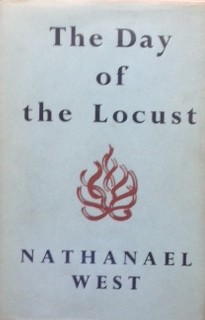Inspiring Older Readers
 posted on 20 Sep 2017
posted on 20 Sep 2017
The Day of the Locust by Nathanael West
History has plenty to tell us about the kind of society we have today and Nathanael West’s icy little satire of Hollywood America in the years following the Great Depression is both an entertaining and sobering read. What does a prolonged and devastating economic and social collapse do to people and how does this change the kind of values they aspire to? What is fame and why is it something that has to be pursued even when the chase bends you out of shape?
What West creates for us is a portrait of the lost and hopeless ones living on the margins of the quest for escapism and glamour that was Hollywood in the inter-war years. These people are self-obsessed, crass and dead-eyed scavengers living on what remains of a dying culture. In contrast with the façade of dreams that the film industry represents, this is a Los Angeles where the hopeless come to die.
At the centre of the story is Tod Hackett an aspiring artist who has been lured to the west coast by the promise of a career painting film sets. His big project though is to paint his masterpiece, an apocalyptical canvas called ‘The Burning of Los Angeles’ which he populates with the grotesques he encounters. But Tod isn’t a detached by-stander, he is drawn into the world of misfits and film wanna-be’s - people who will never, in fact, make it – and West tells us, I think ironically, that Tod
was really a very complicated young man with a whole set of personalities, one inside the other like a nest of Chinese boxes
He quickly finds himself in thrall to the astonishingly beautiful but extraordinarily vacuous, self-centred and scheming Faye Greener around who wasters and users of all kinds circle like flies around dung. Faye is utterly devoid of talents but retains a burning ambition to succeed in movies and lives with her father Harry Greening a former vaudevillian who has turned to being a salesman who relies on confidence tricks to earn a living.
But probably the saddest character of all is Homer Simpson (what a shame that this name can’t any longer be read without connotations), an accountant who has come to California to recuperate from what was almost certainly a nervous breakdown. West creates a memorable character; sexually repressed, mild-mannered and so socially retarded that he’s an obvious target for Faye to use and exploit. Simpson’s physical and intellectual awkwardness is perfectly captured in his uncontrollable, unpleasant and perpetually moving and twitching hands that seem to take on a repulsive life of their own.
The novel moves inexorably towards its cataclysmic ending and it’s an ending inevitably tied into the film industry and the faceless, gormless but frightening mob mentality of the ‘public’ who demand proximity and access to their idols. Caught in an uncontrollable mob riot at the opening of a new movie what happens to Tod is ambiguous – does he experience the moment of epiphany or is he finally consumed by the monster?
I know what I think but you’ll have to read the book yourself and make your own mind up. This isn’t a long story but it is what I’d call real novel writing – it’s essentially a book of ideas where those ideas play out through exquisitely drawn characters who have the power to attract and repel in almost equal measure. The use of language and dramatic timing is so finely judged you’ll find yourself ending before you’re too conscious that you’ve even begun.
Terry Potter
September 2017